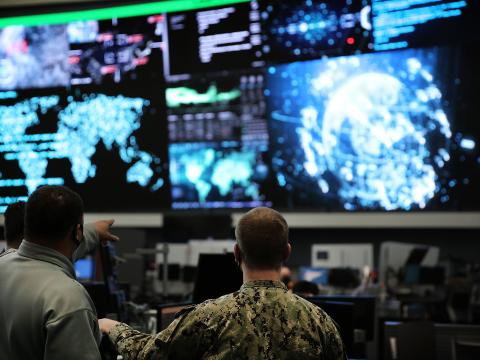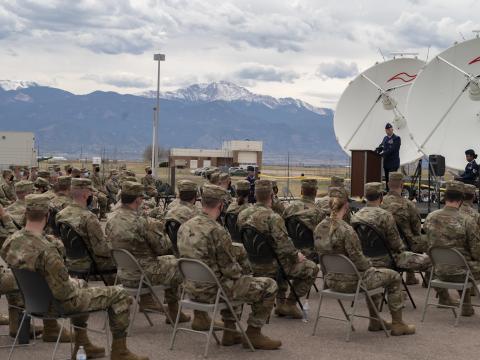Looking Ahead
Over the past three years, AFCEA International has undergone several changes, both internally and externally. Some of these changes reflected the new world that we faced after the September 11, 2001, attacks. Others were a part of the internal activities that a dynamic organization undergoes to remain vibrant. The next three years hold more changes in store for the association, and they promise to be as important as those of the recent past.
The biggest recent change has been an added emphasis on homeland security. AFCEA has been working extensively with governments—large and small—to provide industry outreach opportunities for the wide range of departments and agencies that have come together to help secure the homeland against further terrorist attacks. This effort is all the more vital given the important role that information technologies must play in deterring attack and in aiding first responders.
AFCEA is proud that it has been able to help the departments of Defense and Homeland Security collectively address information technology issues. The model for this assistance is the role that the association has been playing as a bridge for government and industry throughout the Cold War and its aftermath. For more than 55 years, AFCEA toiled to ensure that the military and the private sector worked together to the benefit of the Free World. The West reaped that harvest with its victory in the Cold War, and now the same approach is being applied to homeland security. AFCEA is undertaking this challenge without detracting from the support it provides to its traditional partners in the defense community.
The next three years will bring more advances. Foremost, AFCEA will increase emphasis on supporting the transforming intelligence community as it goes through a period of major change. As with the communications-electronics community in the Cold War, the intelligence community is being called upon to serve as the first line of defense against the global threat to freedom. While this role of intelligence has been a constant throughout recorded history, today it has assumed greater importance with the unforgiving nature of the war on terrorism and the threat to the homeland.
AFCEA is positioning its international organization to provide as much information technology service to the intelligence community as it did for the Defense Department over the past five decades. This commitment already has taken shape at AFCEA International headquarters with the promotion of Col. Steve Ritchey, USAF (Ret.), to the position of vice president for intelligence. This is not a superficial move. It reflects the importance that AFCEA places on its role with the intelligence community. This new focus on intelligence is a vital step forward for the association—and for the Free World.
Internally, AFCEA continues to grow. Recruitment has been the primary source of this growth, and the next three years will see the association increase emphasis on retention. A key element of any membership organization’s viability, retention is a reflection of individuals believing that they are welcome and that they are seeing a good return on their investment. AFCEA is embarking on a thrust that seeks to ensure both of those conditions.
The best way to achieve this goal is for a longtime AFCEAN to become actively involved with each new member. So, the association is aiming for chapters to welcome new corporate sponsors or individuals on a personal scale. A new company joining the association would receive the benefit of expertise from a like-minded corporate individual who could show the new company how to gain the maximum benefit from its AFCEA sponsorship. For the individual new member, a chapter member would provide mentorship and help the individual become involved in chapter activities. This way, the new member could experience the benefits of AFCEA membership firsthand through a member who knows the value of the association. With this approach to corporate sponsorship and individual membership, people would see a good return on their personal or their organization’s investment in both time and money.
These internal and external efforts lie at the heart of AFCEA’s international efforts as well. It has been very rewarding to see the growth in European membership and activities, especially TechNet Europe. AFCEA is playing a vital role in ensuring that NATO understands the transformation process that is taking place on the western side of the Atlantic Ocean. Not only has the TechNet Europe show grown, but also the Supreme Allied Commander Europe Transformation event has increased in value. Adm. Edmund P. Giambastiani Jr., USN, conducted this event last year in Europe, and it appears that he will conduct it again in the future.
All NATO nations are dedicating themselves to the interoperability and integration that are required to fight in the future. This same challenge looms large in the fight against terrorism, and the spirit of NATO that helped win the Cold War will be needed to win the war against that 21st century threat. AFCEA, through its AFCEA Europe office, is making great strides in strengthening the ability of both NATO and U.S. militaries and industries to work together to benefit all nations.
In whatever global hemisphere it is active, AFCEA International is very proud of the role it has played in the past. It is very pleased with the progress it is making to support the security of the Free World as it faces the future. And, it is not hesitating to move forward to ensure that those efforts never will be in vain.



